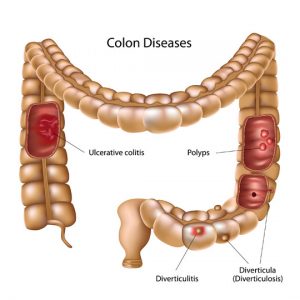Colon cancer and ulcerative colitis
Only about 5% of ulcerative colitis sufferers develop colon cancer. The risk of developing cancer, however, is increased by the duration and extent of colonic involvement. For example, if only the lower part of the colon and anus is involved, the risk of cancer is no higher than normal. However, if the whole colon is involved, the risk of cancer can be up to 32 times higher than the normal rate.
Sometimes precancerous changes occur in cells that form a layer on the colon. These changes are called “dysplasia”. People who have dysplasia are more likely to develop cancer than people who don’t. Doctors look for signs of dysplasia when they do colposcopy and when they look at tissue that has been removed during the exam.
According to the 1997 guidelines on screening for colon cancer, people who have had IBD throughout the colon for at least 8 years and those who have had IBD only in the left colon for at least 15 years should have a colposcopy every 1 to 2 years to check for dysplasia. This type of screening has not been shown to reduce the risk of colon cancer, but it may help in early diagnosis if it does occur.

